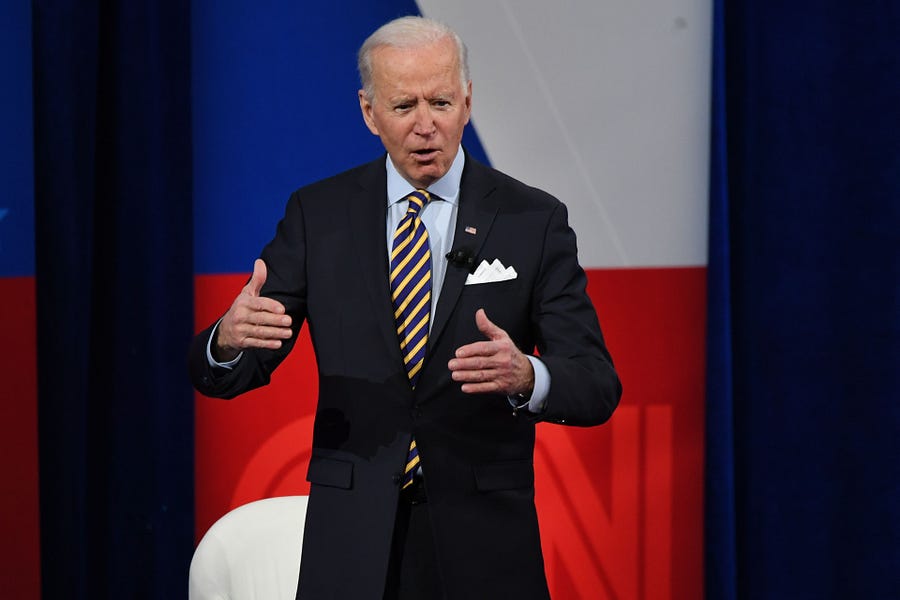An article from the New York Post accused President Joe Biden of shrugging off human rights violations and genocide in China and embracing cultural relativism to downplay concerns. The headline: “Biden Dimisses Uighur genocide as part of China’s ‘different norms’.”
The article is based on comments Biden made during a CNN town hall in Wisconsin on Tuesday. The Post article begins:
President Biden is dismissing the genocide against the Uighur population in China, dubbing the mass internment a ‘different norm’ — despite the State Department this month responding to ‘atrocities’ in the camps, following reports of systemic rape and torture.”
The commander in chief made the remarks after being asked during the CNN town hall Tuesday evening about his recent conversation with his Chinese counterpart, starting his response by relaying Xi’s justification for the abuses.
That reporting is false. Biden did not begin his answer with Xi’s justification for the abuses. Instead, Biden started by citing the moral imperative the U.S. has to condemn such abuses. He followed with an explanation of his understanding of Xi’s motives—what the Post characterized as Biden’s dismissal—and punctuated his comment by reiterating his obligation as president to speak for American values. The initial exchange follows (and you can read the whole transcript here):
CNN host Anderson Cooper: What about the Uighurs? What about human rights abuses in China?
BIDEN: The Uighurs. We must speak up for human rights. It’s who we are. We can’t — my comment to him was — and I know him well, and he knows me well. We’re — a two-hour conversation.
COOPER: You talked about this to him?
BIDEN: I talked about this too.
And that’s not so much refugee, but I talked about it. I said, look — Chinese leaders, if you know anything about Chinese history, … the time when China has been victimized by the outer world is when they haven’t been unified at home.
So, the central — to vastly overstate it, the central principle of Xi Jinping is that there must be a united, tightly controlled China. And he uses his rationale for the things he does based on that. I point out to him, no American president can be sustained as a president if he doesn’t reflect the values of the United States.
The author, Emily Jacobs, then claims that Biden proclaimed his intention to avoid speaking out against China’s abuses and aggression. She wrote: “Biden continued in his response that he is ‘not going to speak out against’ the Chinese Communist Party’s belligerent actions in Hong Kong, against the Uighurs, or in Taiwan.”
In fact, Biden plainly conveyed the opposite meaning, suggesting it was preposterous to think that he’d remain silent in the face of China’s behavior.
After pointing to his obligation to speak out against human rights abuses and to “reflect the values of the United States,” Biden said: “And so the idea that I am not going to speak out against what he’s doing in Hong Kong, what he’s doing with the Uighurs in western mountains of China and Taiwan — trying to end the one China policy by making it forceful, I said—by the way, he said he gets it.”
(An earlier version of the article appears to have misrepresented Biden more flagrantly, attributing to the president an unsaid “is” to misconstrue the meaning of what Biden actually said. Compare the accurate, verbatim transcription above to the the original, inaccurate version here: “And so the idea is that I am not going to speak out against what he’s doing in Hong Kong, what he’s doing with the Uighurs in western mountains of China and Taiwan — trying to end the one China policy by making it forceful… [Xi] gets it.”)
The Post article also falsely claims that Biden “sidestepped” a question from Anderson Cooper about whether China will face repercussions for its human rights abuses.
In fact, Biden explicitly—and without qualification—promised repercussions for China’s human rights abuses. The exchange:
COOPER: When you talk to him, though, about human rights abuses, is that just — is that as far as it goes in terms of the U.S.? Or is there any actual repercussions for China?
BIDEN: Well, there will be repercussions for China. And he knows that.
What I’m doing is making clear that we, in fact, are going to continue to reassert our role as spokespersons for human rights at the U.N. and other agencies that have an impact on their attitude. China is trying very hard to become the world leader and to get that moniker. And to be able to do that, they have to gain the confidence of other countries.
And as long as they’re engaged in activity that is contrary to basic human rights, it’s going to be hard for them to do that. But it’s much more complicated than that. I’m — I shouldn’t try to talk China policy in 10 minutes on television here.
If you have a claim you would like to see us fact check, please send us an email at factcheck@thedispatch.com. If you would like to suggest a correction to this piece or any other Dispatch article, please email corrections@thedispatch.com.







Please note that we at The Dispatch hold ourselves, our work, and our commenters to a higher standard than other places on the internet. We welcome comments that foster genuine debate or discussion—including comments critical of us or our work—but responses that include ad hominem attacks on fellow Dispatch members or are intended to stoke fear and anger may be moderated.
With your membership, you only have the ability to comment on The Morning Dispatch articles. Consider upgrading to join the conversation everywhere.